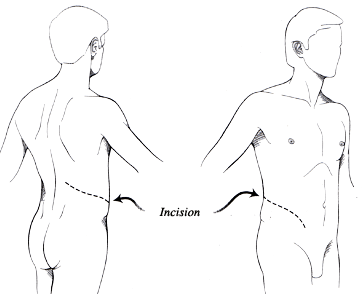The Surgery
The surgery to remove a kidney is called a nephrectomy. The catheter, a soft rubber tube is inserted into your urethra to drain urine from your bladder while you are asleep for your surgery. There are two types of nephrectomy; laparoscopic nephrectomy and open nephrectomy. All of our donor nephrectomy surgeons at The Ottawa Hospital are trained to do laparoscopic nephrectomies. There is a small chance they might need to do an open nephrectomy in certain circumstances.
Laparoscopic Nephrectomy
This surgery involves three or four small incisions in the abdomen. Through these incisions, surgeons insert special instruments to detach the kidney, as well as a tiny camera to show the surgery on a video screen. The kidney is removed through a small incision below the navel. Usually the left kidney is taken because it is often easier to remove than the right . The surgery usually takes three to four hours. It is done under general anesthetic so the patient is asleep during the surgery. The hospital stay is two to four days and recovery is up to 8 weeks.

Open Nephrectomy
This surgery involves an incision about 10 inches on the side of the abdomen, along the bottom of the lower rib. The surgery takes two to four hours. The hospital stay is three to five days and recovery is up to 8 weeks.
All of our donor nephrectomy surgeons at The Ottawa Hospital are trained to do Laparoscopic nephrectomy. There is a small chance they might need to do an open nephrectomy in certain circumstances .

Recovery Period
• For the first 24 hours after surgery, you will be closely monitored by nurses. You will be
under the care of the surgeon who did your surgery.
• A catheter, a soft rubber tube, is inserted into your bladder to drain urine.
• You will be encouraged to do leg exercises to prevent blood clots. You will also be encouraged to do deep breathing and coughing exercises to maintain good lung function.
• A Patient Controlled Analgesia (PCA) pump is used to control pain. This allows you to control when you get pain medication by pressing a button. The pump is programmed so you cannot give yourself too much. The PCA pump is usually stopped after one day and replaced with pain medication by mouth.
• Some patients may require oxygen by nasal tubing for a short period.
• For the first two days following surgery, you will have blood and urine tests. Your blood
pressure, pulse, temperature, breathing and incision sites will be checked regularly.
• Your level of activity will progress from sitting in a chair to walking in the hall.
• Your diet will also progress from ice chips through to a light meal, usually by the end of the
first post-operative day.
• Most donors who have laparoscopic nephrectomy will be discharged from hospital two to four days after surgery. Most donors will be able to bathe, dress and fully care for themselves by the time they leave the hospital.
• In general, you should avoid lifting anything heavier than 10 pounds for six weeks after surgery. This will let your muscles heal properly.
• You should be fully recovered within eight weeks

